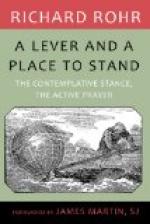Shortly after Covington’s return to New York the Companies’ offices were honored by a visit from Mr. Andrew Harris. The caller asked that his card be taken to Mr. Covington, and as it bore a pencilled memorandum that his business was important and confidential, he was ushered into the private office of the acting head of the Companies. Mr. Harris seemed deeply interested in studying the appearance of the man he had come to see—so much interest, in fact, that Covington resented his scrutiny and inquired the nature of his business.
“Excuse me,” Harris said, quickly; “I came to talk over the proposed merger of the New York street railways.”
“Then you doubtless wish to see Mr. Gorham,” Covington replied. “That is a matter which is wholly in his hands. He is at present in Washington, but will be here within a week.”
“Are you not at least partially familiar with the details?” Harris inquired, apparently unmoved by the news of Mr. Gorham’s absence.
“I could scarcely say that I am unfamiliar with them,” Covington admitted; “but the idea of the merger was Mr. Gorham’s, and he is naturally in closer touch.”
“Do you object to talking things over with me a little?” Harris asked. “There may be some points that I know more about than Mr. Gorham.”
Covington nodded acquiescence, though somewhat in the dark as to the object his visitor had in mind.
“In the first place,” Harris began, adjusting himself in his chair, “let me say that I am a director in the New York Street Railways Company, which is the largest of the present organizations which are eventually to be consolidated into the Manhattan Traction Company. The franchise, as you doubtless know, has already been put through the Board of Aldermen, and the only question now remaining is whether it is to be turned over to certain gentlemen in New York who originally planned to complete the deal, or to the Consolidated Companies.”
“Mr. Gorham has, I believe, advanced to those interested very logical arguments to show that the Consolidated Companies could engineer the amalgamation to the distinct advantage of the various roads,” Covington suggested, as his visitor paused for a moment.
“He has,” Harris admitted. “There is no doubt in anybody’s mind that what he says is right; the roads and the stockholders would be distinctly benefited—but how about the directors? That is the question I came here to have answered.”
“It is a question which Mr. Gorham must answer.”
Harris subjected him to another careful scrutiny. “Perhaps so,” he said, at length, “but I should like to get your opinion on the matter. You are one of the directors, I understand.”
“I had an idea that Mr. Gorham had already answered that question to Mr. Brady, and that there was enough in the deal to satisfy every one.”
“There is enough for every one,” assented Harris, with decision; “the only question is how it is to be divided. We all supposed that we were to become stockholders in the Consolidated Companies, in which case we should have gained something at both ends; but Gorham evidently changed his mind about that, which leaves us nothing but the original rake-off.”




